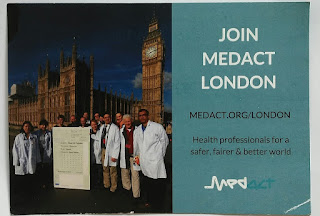Short notice of two events
Social Movements then and now: 20 years on global cooperation
Sunday June 16th 2019
7pm to 930pm
646 Commercial Road
London E14 7HA
London E14 7HA
Plus a newly minted PGA Oral History Project Facebook page
available for liking and sharing,
Tweets- ecology
In 1999, twenty years ago, the anti-globalization movement opposing unfair trade imposition
on the world’s peoples went from disconnected protests on different continents to linking up resistance
and calling the very first, simultaneous action happening all around the world.
Today the cooperation of social movements from around the world is well established.
In this evening event we will hear from speakers and then have discussion.
Part 1 Speaker from the original global days of action #Friedericke Habermann:
Why and how did we do what we did? What was the Peoples' Global Action network?
Part 2 Speakers from social movements now #Rising Tide, Extinction Rebellion, Reclaim the Power:
Why and how are we building the climate justice movement today?
Speakers Zoey, Liam, Saartje #Land Workers Alliance:
Where does the UK fit within the global movement for food, farming and environmental justice?
Speaker Sara
Part 3 Questions and Discussion #Everyone:
What can we learn from our movement histories to help us today?
#facilitator Michael Reinsborough, Peoples' Global Action Oral History project
Event organized by http://pgaoralhistory.net/ in collaboration with http://antiuniversity.org/
- Here is about Friedericke
- And a bit about some of her press role
- Rising Tide https://www.risingtide.org.uk/
- Reclaim the Power https://reclaimthepower.org.
uk/ - Extinction Rebellion https://rebellion.earth/
- Land Workers Alliance https://landworkersalliance.
org.uk/
Friedericke is confirmed to speak on global action days
Zoey confirmed as speaker from Rising Tide
Saartje confirmed as speaker for Reclaim the power
Liam confirmed as speaker for Extinction Rebellion
Sara confirmed to speak for Land Workers Alliance
The schedule will look something like this…
7.00 brief introduction (Five minute remarks: the PGA oral history project and
why talk about social movements then and now)
why talk about social movements then and now)
- 7.05 People's Global Action – what began the global days of action?
- -why and how did we do what we did?
7.30 Five minute remarks: reclaim the streets J18 carnival against capitalism in 1999
- 7.35 Social Movements now -why and how are we building movement today?
- – (10 min) comments from rising tide,
- and (10 min) reclaim the power: Call out for Drax Power Station action
- (25 min) extinction rebellion.
8.25 Five minute remarks: the Captain Swing rebellion 1830s land workers
Note we are looking for someone(s) who can talk about/help research/make suggestions
re Captain Swing Rebellion 1830s Sussex county agricultural workers at advent of the
re Captain Swing Rebellion 1830s Sussex county agricultural workers at advent of the
harvester machine - please get in touch.
8.30 Food, farming and environment -Land Workers Alliance
– where does the UK fit within the global movement for food sovereignty and land work?
- 8.45 Questions, discussion
--------------------------
20 years since J18 // Carnival Against Capital
June 18 @ 6:30 am - 9:30 pm
There will be a discussion on Tuesday 18 June on ‘20 Years since J18’
- looking back at the June 1999 anti-capitalist demo/festival/riot in the City of London
and related issues.
It’s at the Mayday Rooms, 88 Fleet Street London EC4Y 1DH
6.30-9.30pm
.. reminiscences, images, analysis promised...
- looking back at the June 1999 anti-capitalist demo/festival/riot in the City of London
and related issues.
It’s at the Mayday Rooms, 88 Fleet Street London EC4Y 1DH
6.30-9.30pm
.. reminiscences, images, analysis promised...

June 18 1999 saw an eruption of protests around the world. But amongst many demonstrations it was the tumult that took place in the City of London that offered a new model for revolts that tore through many cities. That day inaugurated a global anti-capitalist movement, which lasted into the mid-2000s. The actions combined riot with theatre, and brought together activists from a range of single-issue campaigns, from rave to anti-roads, from student movements to radical unions, from hunt sabs to anti-globalisation activists, alongside all sorts of people who had never been involved in protest before. In the subsequent years similar actions took place in many cities, most often around global government summits.
This year marks 20 years since the Carnival against Capital. So on June 18 this year we are planning an event that will bring together people who played a part in these histories and those who want to learn about it. The event will let us combine people’s memories with material traces from the protest movements of that time, to look back and to reflect on what happened then from the context of today’s struggles and social movements. We will be finding ways to contextualise what happened in 1999 by thinking about the social movements and protests that led up to it, and the subsequent wave of struggles that grew from it. And we will be unearthing and presenting our multimedia archive, and opening conversations in order to collectively think through, criticise, and celebrate a riotous day in the city.





